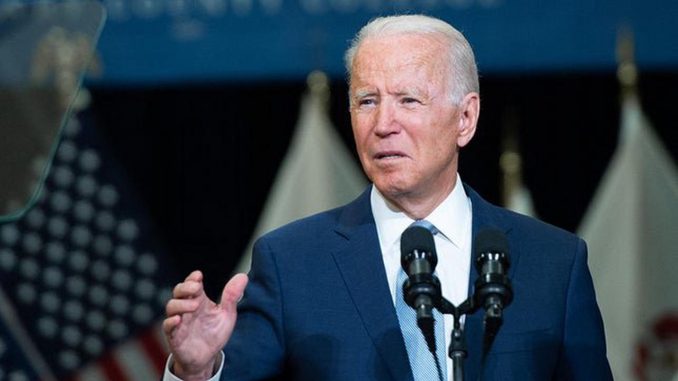
President Biden is under pressure to expand his criminal justice reform efforts to include the dozens of U.S. attorney offices across the country that prosecute federal crimes.
Advocates have applauded Biden’s criminal justice agenda, such as his plans to increase the number of former public defenders on the federal bench, but stress that the same priorities should be applied when selecting prosecutors to oversee the country’s 93 districts.
Rachel Barkow, a professor at the New York University School of Law, says that because of the power that prosecutors wield, Biden’s appointments could make or break his reform agenda.
“It wouldn’t be enough to just focus on the courts as the place where you’re committed to diversifying and getting a reform minded perspective in there,” Barkow said. “You absolutely have to have the same attitude when it comes to the U.S. attorneys’ posts.”
“You can’t have a reform agenda, like the one that you committed to on the campaign trail, if you don’t have people in those offices who are going to carry that out,” she added.
With more and more cities electing progressive district attorneys who campaigned on reducing mass incarceration, reformers are pushing Biden to follow suit and pick a new breed of federal prosecutors.
In March, a coalition of advocacy groups sent a letter to Biden calling on him to nominate federal prosecutors “capable of delivering fair sentencing, rearranging prosecutorial priorities and rooting out misconduct.”
Administrations of both parties have historically tapped career prosecutors and attorneys from prestigious law firms to fill U.S. attorney positions around the country, a trend that critics argue has cemented a tough-on-crime culture that is increasingly at odds with the nation’s evolving views on criminal justice.
In recent years, voters in major cities such as New York, Philadelphia, Boston and San Francisco have been electing progressive candidates to serve as local district attorneys.
The reformers have campaigned on using prosecutors’ broad authority and discretion to shift priorities away from low-level offenses, reduce sentencing recommendations and other policies aimed at decreasing the country’s massive prison population.
Criminal justice reform activists say that Biden should follow the example set by the progressive prosecutor movement at the local level and draw upon public defenders and other attorneys who see a need for change.
“It should be a strong indication for the administration that the public has acknowledged that we’re at a point where we need to erase 40 years of prison buildup and extreme sentencing and prosecuting people for really low level offenses and sending them to prison,” said Kara Gotsch, deputy director of the Sentencing Project, a group that advocates for eliminating mass incarceration.
“I mean, people are tired of it,” Gotsch added. “And I think that’s why we’ve seen this success around reform-minded prosecutors, and I think it would be politically out of touch for this administration not to recognize that. Particularly given what they said on the campaign trail around criminal justice, this should be a priority for them to bring these reform-minded prosecutors into the Department of Justice.”
Former President Trump and his administration were openly hostile toward the newly elected district attorneys who had campaigned on reform, accusing them of turning their backs on police and public safety.
And in cities like Philadelphia, Trump’s U.S. attorneys even fought the local reform efforts.
U.S. attorneys are the top prosecutors for each of the districts around the country, serving as the local face of federal law enforcement. While they are bound by policies set by Justice Department leadership in D.C., they have broad discretion when it comes to deciding what charges to bring, if any, and whether to seek detention for defendants awaiting trial, as well as the severity of recommended sentences.
“When that power is wielded thoughtfully and carefully, and with an acknowledgement of the existing extremes of our federal criminal justice system, a lot of good could be accomplished,” Gotsch said.
The decisions made by federal prosecutors are also influenced by Cabinet-level directives. For example, during the Obama administration, then-Attorney General Eric Holder issued policy memos promoting leniency in U.S. attorneys’ charging decisions. In 2017, after Trump took office, now-former Attorney General Jeff Sessions implemented a policy directing federal prosecutors to “charge and pursue the most serious, readily provable offense,” meaning charges that carried the most severe sentences.
A peer-reviewed study published online last week by the journal Criminology found that the level of implementation of the Sessions memo varied by region and was impacted by whether a Trump-nominated U.S. attorney had been confirmed in a certain district.
“If nothing else, by being more ideologically responsive to the administration that appointed them, they are likely willing to enforce the directives in the geographically dispersed federal districts, even in the face of resistance by career prosecutors in their offices,” the authors of the study wrote.
“Specifically, it seems likely that Trump-appointed U.S. Attorneys were sufficiently ideologically aligned with the directives included in the Sessions 2017 memo to be able to reshape existing local practices in regard to drug case prosecutions.”
Barkow says that bringing reformers in to serve as federal prosecutors will not only help Biden implement his agenda at the front lines, but could also serve to influence the thinking across the board within the Department of Justice (DOJ).
“Unfortunately, for as long as I’ve been studying this issue, it doesn’t matter whether it’s Democratic or Republican administrations, DOJ has been the leading obstacle to doing some of these things,” she said. “That’s why it matters who these U.S. attorneys are, because if [DOJ leadership] considers doing different things, it’s going to ask for feedback from the U.S. attorneys, and if they push back it makes it less likely that you’ll see a DOJ position in favor of reform.”
Miriam Krinsky, executive director of the group Fair and Just Prosecution, which has backed the reform efforts at district attorneys offices around the country, said the U.S. attorneys offices are due for a shakeup.
“I think that there has been for a long time among prosecutors, whether federal prosecutors or local prosecutors, an autopilot in how the work has been done,” said Krinsky, who spent 15 years as a federal prosecutor. “And this presumption that we can punish our way out of poverty and out of people who are struggling with substance use, and mental illness, and so much more that really isn’t benefited by the responses that have defined the criminal legal system.”
“We have to learn something from that,” she said.
Via The Hill


